Why Mineral Oil Belongs in Every Kitchen
Most kitchens are well stocked with oils, but your cutting boards, butcher blocks, and knives need one that's frequently missing: food-grade mineral oil.
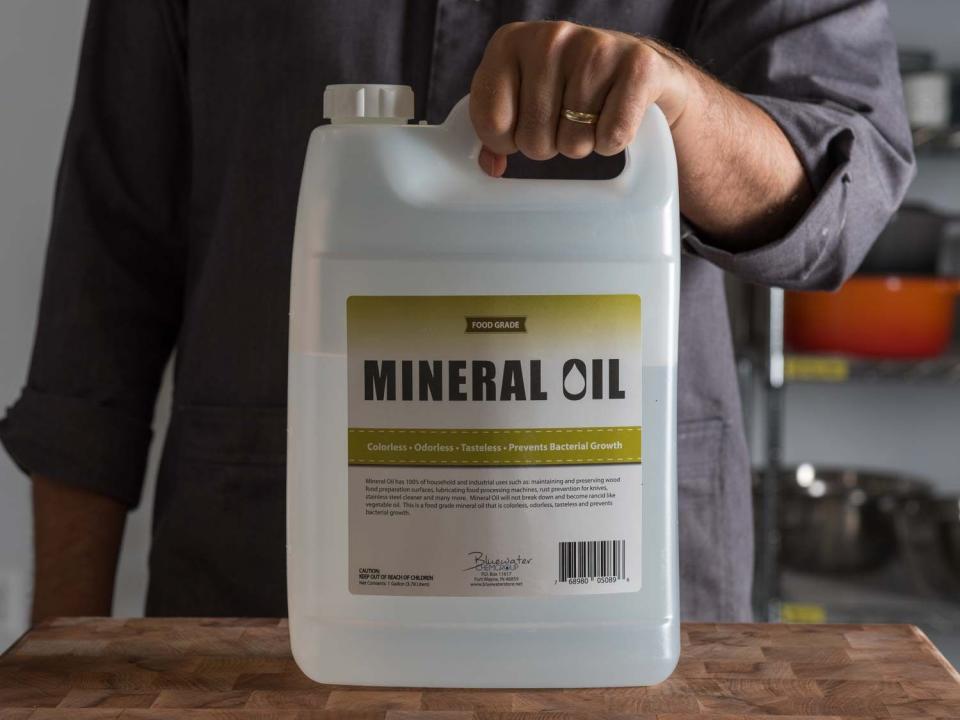
Serious Eats / Liz Clayman
People rub it on babies' butts, it's been used as a laxative, new-age healers turn it into essential oils, and mechanics grease gears with it and pour it into engines to keep things running smoothly. Mineral oil—a broad class of odorless, colorless oils—is used in the cosmetics industry, science labs, factories, industrial settings, and... pretty much everywhere else.
But you'll rarely find it used in the one place where it's needed most: the kitchen.
Rifle through the cabinets of most home kitchens, and you'll likely find bottles of corn oil, canola oil, safflower oil, peanut oil, olive oil, and sesame oil. You may even find the odd bottle of hazelnut, walnut oil, or mustard oil, if the home cook is fancy like that. It'd be a rare day, though, that'd you'd stumble across a jug of food-grade mineral oil.
That's unfortunate, because mineral oil belongs in every kitchen. It's not a cooking oil like the others, but it has a limited yet important set of applications.
What Is Mineral Oil Good For?
There are two important things mineral oil is good for in the kitchen. The first is wood, and the second is metal. In both applications, be sure to use mineral oil that's marked "food-grade"—you don't want to eat nasty additives that can be found in other types of mineral oil. (Though it has indeed been consumed for its laxative qualities, there are some risks associated with ingesting mineral oil in certain populations.)
Conditioning Wood With Mineral Oil
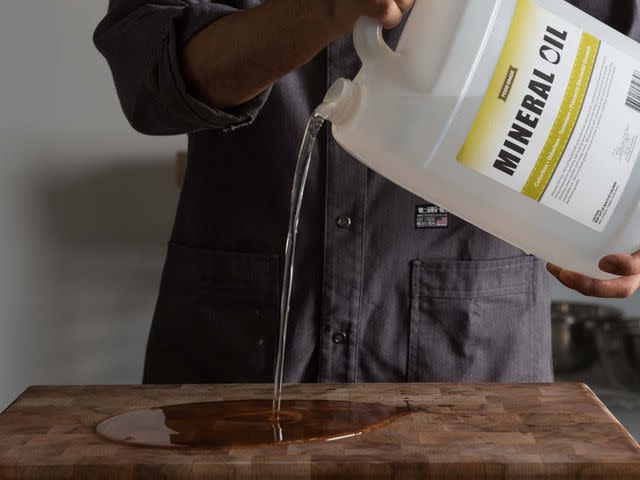
Serious Eats / Liz Clayman
First, and probably most important, wood: Any unvarnished wood in the kitchen, including wood cutting boards, butcher-block countertops, and kitchen islands, needs to be conditioned with oil to keep it in prime condition. Cutting boards and butcher blocks that are allowed to dry out will eventually warp and crack, especially at the seams where the pieces of wood join together.
Mineral oil soaks into the wood, helping to keep it plump and protected. It doesn't just keep wood in good condition, though—it also acts as a water-repellent barrier. It will reduce the chances that the wood will stain when wine is splashed on it; it will also reduce the chances the wood will rot from prolonged contact with water.
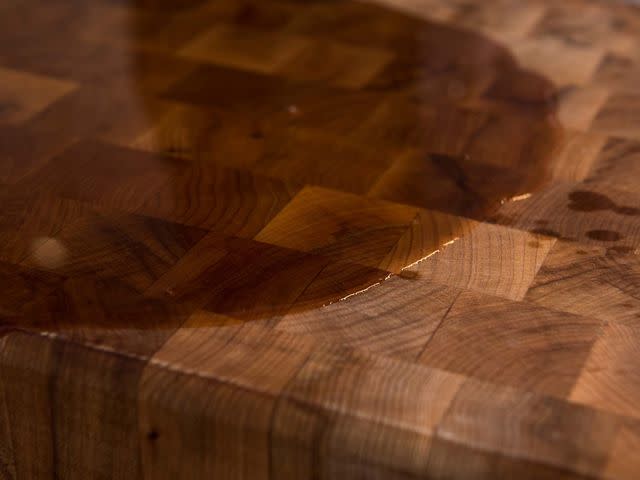
Serious Eats / Liz Clayman
How often should you oil a cutting board or butcher block? Pretty much whenever it looks like it's dry, which you can tell by sight or by sprinkling a little water on top. If the water absorbs into the wood, it's time for an oiling (read Kenji's article on how to oil wooden cutting boards if you need some instructions).
Read More: How to Season and Maintain a Wooden Cutting Board
If you have butcher-block countertops, it's often a good idea to do several frequent applications of mineral oil early on, to be sure that the wood is fully saturated. As time goes on, you can decrease the frequency to once a month or once every other month, or whatever your schedule allows.
Most wood cutting boards come well oiled, but over time, and especially with frequent washing, they'll need to be reconditioned with oil.
First, make sure the boards are fully dry, particularly if you've washed them recently.
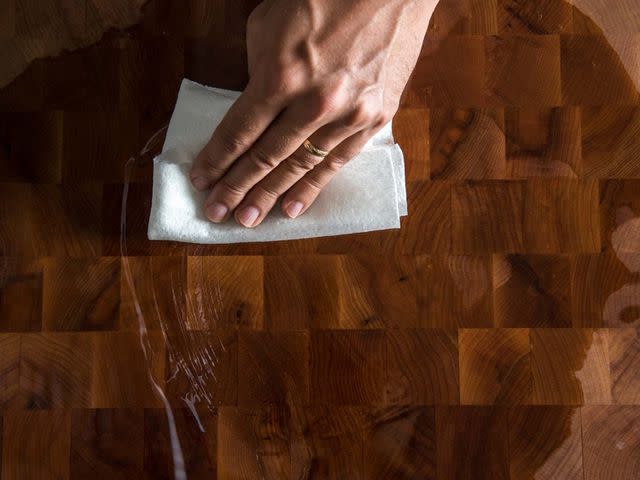
Serious Eats / Liz Clayman
Whether you're treating a butcher block or cutting boards, oiling them is as simple as liberally pouring the oil all over them, spreading it around to cover all surfaces, and then giving them time to drink it up. I often leave them overnight, returning in the morning to wipe up any excess oil that remains unabsorbed.
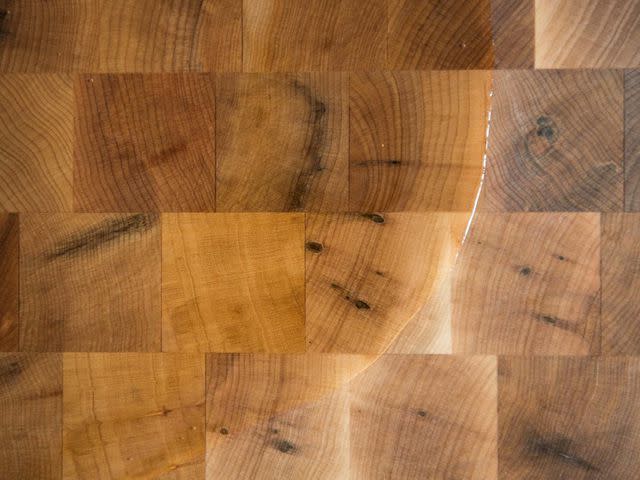
Serious Eats / Liz Clayman
If you have both butcher-block countertops and wood cutting boards, you can do them all at once, flooding the countertops with oil and then soaking your cutting boards on top.
Protecting Metal With Mineral Oil
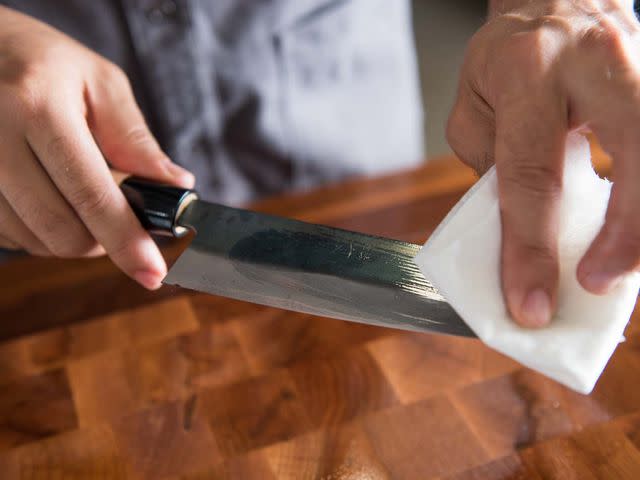
Serious Eats / Liz Clayman
Any home cooks who own carbon steel knives will also need mineral oil. There's a lot to like about carbon steel knives, but, unlike rust-resistant stainless steel, carbon steel is vulnerable to moisture. It's not as simple as drying them well after washing, either—stored for enough time in a humid environment, the knives will eventually rust.
The solution is to rub them lightly with food-grade mineral oil after washing and drying them. The oil forms a protective barrier on the blades, preventing moisture in the air from corroding the metal.
Even kitchens with stainless steel surfaces can benefit from a mineral-oil treatment. While the stainless steel doesn't need a coating of mineral oil, the oil can still be used to clean and polish the metal, giving it a gleaming finish.
Why Use Mineral Oil?
What is it about mineral oil that makes it so well suited to these kitchen applications? In a nutshell: resistance to oxidation.
Have you ever noticed that certain surfaces in your kitchen tend to get slightly sticky over time? This is usually due to cooking oil that has oxidized. Oil, as you can imagine, gets on every surface in a kitchen—it spits and spatters, drips, smears, and vaporizes. Eventually, it forms a thin layer on cabinets, on the hood or vent above your stove, on fans and ceilings...everywhere.
Over time, those cooking oils oxidize, a complex process that eventually leads to molecules linking together to form larger molecular chains, called polymers. As these large polymers form, the oil becomes more viscous. Mix in the inevitable dust and dirt that settles on the thickening oil, and you get that awful sticky coating that can be so hard to remove. (Which is why it's best to clean those spots very frequently so that coating doesn't reach the impossible stage, as I explained in my guide to cleaning stainless steel pots and pans.)
Perhaps some of you are seeing the word polymer here and making the connection to the process of seasoning cast iron. It's basically the same process: With enough heat and time, those polymer chains in the oil move past the thick-and-sticky stage to become a totally hard substance—the seasoning on your cast iron skillet. (If you've ever seasoned a cast iron pan and found it sticky to the touch after, that's a sure sign that the oil isn't polymerized well enough; it needs more heat and time, and maybe a lighter coating of oil, to complete the transformation.)*
*Just to further fill in the picture, this is the same phenomenon observed in "drying" oils (such as linseed oil and other oils sometimes used to make varnish), which are designed to polymerize quickly, forming a hard, durable, and protective barrier on woods, paint, et cetera.
Mineral oil is less susceptible to oxidation than those cooking fats. This means it can remain fluid even after exposure to heat and the passage of time. It's not perfect in this regard—it, too, can eventually oxidize. A lot of mineral oil has additives to help ward against this, including antioxidants and other ingredients that help keep the base oil as close to its original state as possible, for as long as possible. Food-grade mineral oil has antioxidant additives, like vitamin E, that can play this role while remaining safe to ingest.
This is why mineral oil is an absolutely terrible seasoning oil for cast iron. It simply won't form the durable, nonstick layer of polymers you need. But what makes it bad for seasoning a pan is what makes it great for protecting cutting boards and knives—it won't grow thick, sticky, and rancid with time.
What Kind of Mineral Oil Should You Buy?
There are a number of products out there marketed as being specifically for oiling cutting boards, butcher blocks, and knives. Some contain additives, such as beeswax, that may have beneficial effects on wood.
But above all, the thing I look for in the mineral oil I use on my cutting boards and knives, aside from it being safe to ingest, is quantity: I want a lot on hand, so I can really flood my cutting boards and countertops.
While ordering mineral oil online at Amazon is convenient, you can also find inexpensive food-grade mineral oil at hardware stores and pharmacies, so there's really no excuse to not have some mineral oil around your kitchen. Your wood and metal surfaces will thank you.
Read More: The 4 Best Wooden Cutting Boards, According to Our Tests
September 2018

